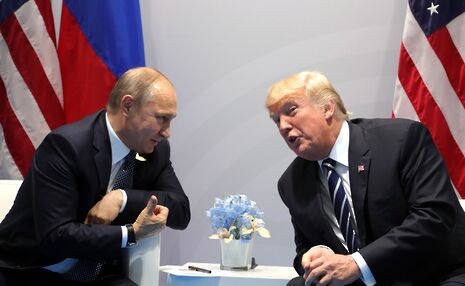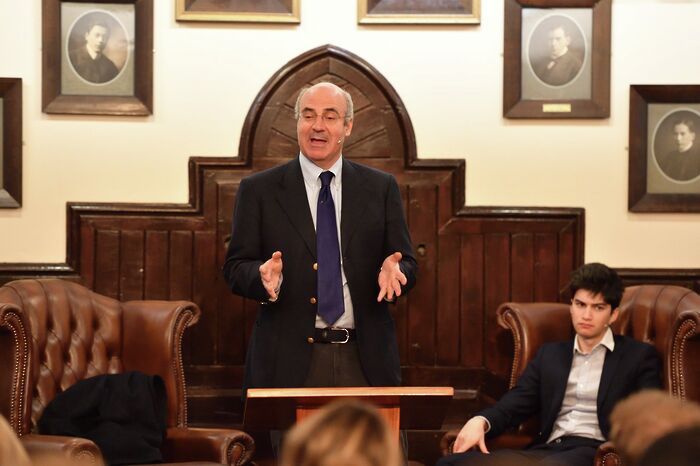Luke Harding: ‘Russia found it easy to penetrate the Trump campaign’
Felix Peckham talks to Luke Harding, a foreign correspondent at The Guardian and author of The Snowden Files, about the Panama Papers, Julian Assange, and Russian interference in foreign countries

“The superrich and international corporations have simply exited from the messy world of paying tax, leaving the rest of us, the fools and idiots, to pay our taxes dutifully.” As one of the journalists who worked on the release of the Panama Papers in 2016, Luke Harding, the senior international correspondent for the Guardian, is well placed to talk about the problem of mega-rich tax dodgers.
The Panama Papers are millions of leaked documents which detail the activities of 214,488 offshore entities. Harding’s naivety at the beginning of the process of revealing the secrets within was quickly corrected: “I was of the view that offshore was a sort of shadowy, minor part of our economic system, and not terribly significant. But it turns out it is the economic system.”
“Theresa May just doesn’t have the bandwidth or capacity to do anything”
“It’s primarily about corporate greed”, Harding tells me, explaining the sense of injustice this has catalysed. “There’s this feeling of inequality and unfairness which is generational, but has also reached absurd and surreal proportions. You have Apple not paying tax, or paying an effective tax rate of one or two percent via complex jurisdiction shopping. Starbucks paying no tax in this country. These are multinational corporations that are more powerful than most nation states. They choose how and where to pay tax. It’s quite astonishing. And the UK plays a huge role in facilitating that.”
Harding is particularly knowledgeable about the role the UK plays in this global tax-avoidance game: “The big four accountancy firms” – that’s PWC, KPMG, Ernst & Young, and Deloitte – “make this possible. As does the revolving door between people inside HMRC [Her Majesty’s Revenue and Customs] and these accountancy firms.”
You’d think that such an enormous practice of tax avoidance and evasion would result in swift political action, yet it hasn’t. “It’s a failure of political will”, Harding says. “It’s very hard to get anyone interested in this. I think David Cameron was quite sincere about doing something about it, but Theresa May just doesn’t have the bandwidth or capacity to do anything. It’s just not a priority.”
“Trump had the psychological characteristics that were appealing to the KGB: vain, narcissistic, unfaithful, promiscuous, and suggestible”
Between 2007 and 2011 Harding was the Guardian’s correspondent in Moscow, until he became the first journalist to be expelled from Russia since the end of the Cold War. The Guardian alleges this was a result of Harding’s criticism of Russia, and of Putin and his wealth specifically. He used this wealth of his experience to write his most recent book, Collusion: Secret Meetings, Dirty Money, and How Russia Helped Donald Trump Win. “To understand what happened in 2016, you need to go back. You have to understand that what happened came from a specific Soviet and Russian context.
“All of the tricks and techniques used to help Donald Trump, and maybe even push him across the line, were old KGB techniques that Putin learnt about in spy school back in the 1970s.
“What’s interesting about Trump is that his first visit to Moscow in 1987 was arranged by the KGB.” This first visit by Trump, Harding suggests, is of paramount importance and was clearly the beginning of an ongoing relationship. An entire chapter in Collusion is devoted to it. “He was wooed by the Soviet government. He had the psychological characteristics that were appealing to KGB handlers: vain, narcissistic, unfaithful, promiscuous, and suggestible. All characteristics they were looking for.”
Broadly speaking, Harding agrees with ex-MI6 agent Steele’s notorious dossier published in 2016: “I think Christopher Steele’s dossier was correct. I think it stepped up in the last few years.” Harding claims that the Kremlin’s intention was not necessarily to facilitate Trump being elected, but that he could be used to “undermine, discredit and delegitimize Hillary Clinton. She would be President, but Trump would be popping up on cable news every night saying she was ‘weak’ and ‘crooked’ and a ‘warmonger’. This, of course, very much suits Russia’s foreign policy agenda.”
“Trump is so abominably rude about everybody. And yet to Putin he is a man of infinite understanding”
Harding also co-authored WikiLeaks: Inside Julian Assange’s War on Secrecy, though he suggests that relations have soured somewhat between himself and Assange: “I worked with Assange in 2010 before he decided he was going to hate The Guardian, and hate me.
“Whenever I say anything critical of Julian he sends me hate mail via his two million Twitter followers.” Assange is the founder of WikiLeaks, though his career has stagnated somewhat due to his self-confinement to the Ecuadorian Embassy since 2012. “I think Julian did some good stuff early on. But more recently he has lost his way. His hatred for the United States, which I can quite understand, means he is no longer interested in transparency, he is interested in selective transparency. He’s become basically the publishing division for Russian Intelligence.”
He continues: “I just wish Julian would leak something from the FSB [The Federal Security Service of the Russian Federation]. If he were to do that he would restore his credibility, but of course he won’t. He won’t leak anything which is damaging to Russian state interests.

“We know that Russia hacked the election.” Harding is unequivocal and unambiguous on Trump’s collusion with Putin’s regime: “these emails were dumped out at times of maximum embarrassment for Hilary Clinton. Someone was advising the Russians how and when to put this stuff out […] Russian intelligence found it fantastically easy to penetrate the Trump campaign.”
A recurrent question is how extensive and deep does this alleged collusion run? Which figures in Trump’s team does it touch? “It goes right to the top,” Harding responds. He tells me of another question he has grappled with, which remains unanswered: “No one from the White House has been able to satisfactorily answer why Trump is so nice to Putin. He is so abominably rude about everybody. And yet to Putin he is a man of infinite understanding.
“Ten days ago Trump refused to impose sanctions on Russia, even though there had been an overwhelming vote in Congress to do that. Why is that? Putin has got tremendous leverage over Trump.
“The question facing Mueller is, ‘is this behaviour treasonous?’’ Robert Mueller is the former Director of the FBI, and the special counsel overseeing the investigation into the alleged collusion between Trump and Russia. Harding claims that “Trump is deeply worried about this. The way he tweets, and says, ‘no collusion, no collusion, no collusion.’ He’s tormented by this. He’s almost like a character out of Macbeth.”
Unsurprisingly, Harding has few kind things to say about Trump, whom he describes as “capricious”, nor for the prospects of American democracy. “If you install someone as flawed and as dangerous as Donald Trump the consequences are global, they’re for everybody. What we’re seeing is the subversion and politicisation of the American legal system. Will democracy in the US survive this episode? This is the ‘Putinisation’ of America – saying everything is ‘fake news’ – it’s a Putin tactic. You just come up with an alternative reality and shout it out.”
 News / Reform candidate retracts claim of being Cambridge alum 26 January 2026
News / Reform candidate retracts claim of being Cambridge alum 26 January 2026 Interviews / Lord Leggatt on becoming a Supreme Court Justice21 January 2026
Interviews / Lord Leggatt on becoming a Supreme Court Justice21 January 2026 News / Report suggests Cambridge the hardest place to get a first in the country23 January 2026
News / Report suggests Cambridge the hardest place to get a first in the country23 January 2026 Comment / How Cambridge Made Me Lose My Faith26 January 2026
Comment / How Cambridge Made Me Lose My Faith26 January 2026 Features / Are you more yourself at Cambridge or away from it? 27 January 2026
Features / Are you more yourself at Cambridge or away from it? 27 January 2026









